

Most Atrocious War Crimes
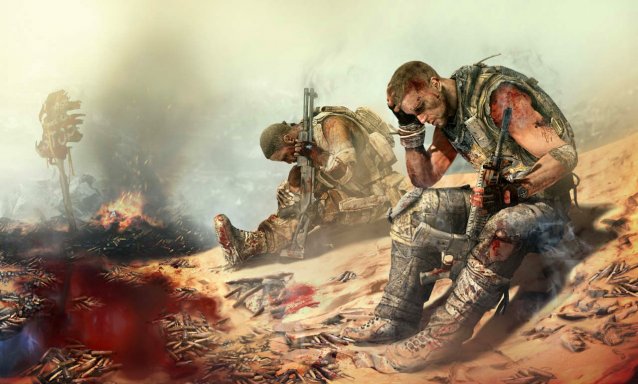
In the last year keen attention has been placed on the moral and political standpoints of games, from their links to the arms industry to their depiction of war. But are they really so bad? The answer is, blatantly, yes. Over two years after the Red Cross asked videogames to better reflect international humanitarian law, here’s our list of the Top 10 War Crimes in Videogames – or is that the bottom 10?
A few provisos. Firstly, war crimes on the part of enemy NPCs are used promiscuously to convince the player that they are completely evil and therefore worth fighting. This would be too easy, so we have restricted our list to war crimes that the player can actually commit or be an accessory to. Secondly, we have generally omitted games which take place in a fantasy universe, including only examples where real-world international law might be applied. Finally, we have tried as much as possible to be scrupulous in the application of the various codes and conventions which govern international conduct in wartime.
Without further ado, here is a list of horrible things that you can do in video games.
10. World in Conflict – Use of air strikes contrary to the Convention on Cluster Munitions.
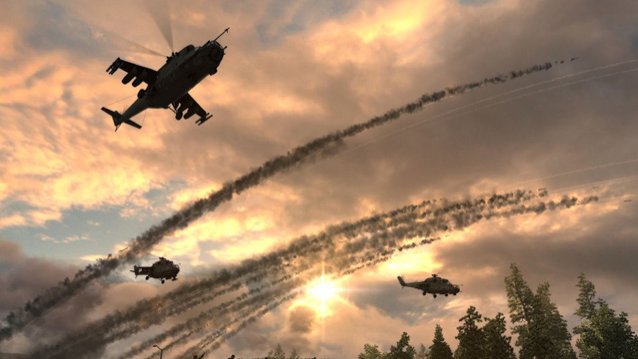
Not many people know that cluster bombs are illegal in many countries under the Convention on Cluster Munitions. There’s good reason for this: 20-25% of the cluster bomblets dropped by NATO in Kosovo, and 40% of those dropped by Israel over Lebanon in 2006, failed to go off. The unexploded bomblets can lie in wait for years, and because they are often brightly coloured, are sometimes mistaken for toys by local children.
Shamefully, the United States has never signed up to the Convention on Cluster Munitions. But many of the other NATO countries – including Portugal, Spain, Germany, France, and the United Kingdom – are signatories. The separation of the NATO faction from the USA in World In Conflict, and its use of planes such as the French Mirage 2000 and the Harrier VTOL, indicate that it is intended to represent these countries. In that case, the NATO player who uses the off-map cluster bomb support weapon is engaging in war crimes.
9. Call of Duty 2 – Executing the wounded in contravention of the Geneva Conventions.
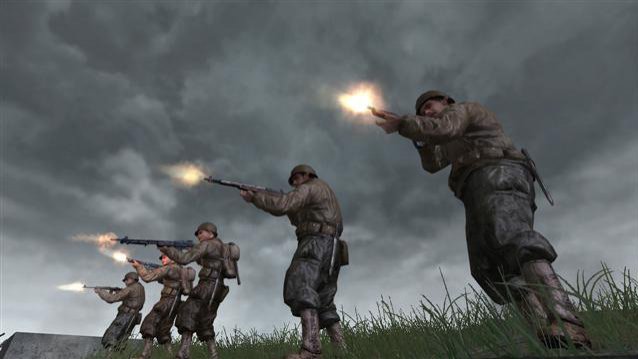
The Geneva Conventions famously forbid the killing or torture of all persons who are ‘hors de combat’ – literally meaning ‘out of the fight’. In Call of Duty 2, however, the player continually shoots enemies who have fallen on the ground and are rolling around screaming their lungs out.
But this situation is more complicated than it appears. Protocol I to the Conventions defines ‘hors de combat’ as including an enemy combat who is “incapacitated by wounds or sickness”, but also specifically requires parties to “abstain from any hostile act”. The whole reason the player ends up shooting at fallen enemies is because, after ten seconds or so of injured writhing, they invariably pull out a pistol and try to shoot you. In such cases, the player is acting in justified self-defence.
Nevertheless, these mechanics lead most players to adopt a habitual and pre-emptive policy of shooting the wounded – which would be vulnerable to prosecution under the Geneva Conventions. CoD 2 sets up its fake reality so that all the player’s brutal acts are justified, but her response to this situation makes her an effective war criminal.
8. The Entente – Deployment of mustard gas in contravention of the Hague Conventions.
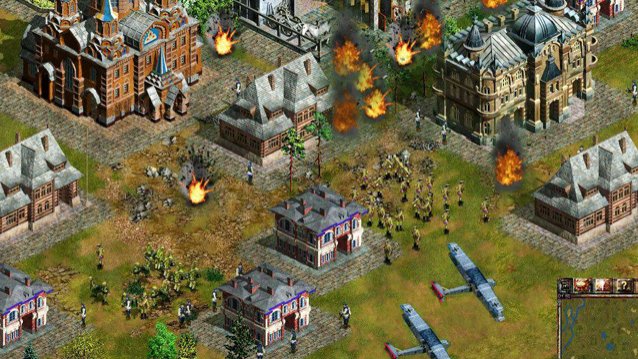
The use of poison gas or chemical weapons in war has been prohibited by various treaties since before World War I. An obvious violator might be the GLA faction in Command & Conquer: Generals, whose units spray poisonous green goo everywhere and whose superweapon is an anthrax-loaded ‘Scud Storm’. However, while the GLA are definitely in what the Geneva Conventions would count as an ‘international war’, it’s not clear whether they are signatories to any such agreement, being a bunch of racist terrorist stereotypes who don’t even have any shoes.
We turn instead to The Entente, a World War I themed RTS from Buka Entertainment. The game allows you to research and use mustard gas and other chemical weapons. Even at the time, these weapons were explicitly forbidden by the Hague Convention of 1907 (Hague IV, Article 23), but the cruel, slow deaths they caused – as detailed by Wilfred Owen in his poem ‘Dulce Et Decorum Est’ – were inflicted by all the major powers, making them one of the founding atrocities of the 20th century.
An honourable mention goes to Empires & Allies, the cutesy Facebook war game by Zynga which includes ‘poison gas’ as an upgrade ability. Only its plot set in a fantasy world saved it from top billing in this entry.
7. Rome: Total War – City massacres in breach of traditional laws of war.
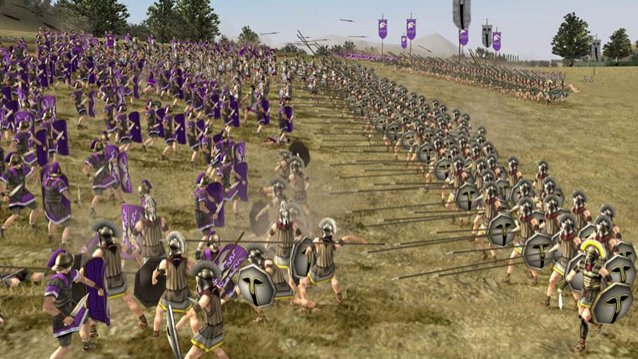
Modern Christian theories of ‘just war’ began after the fall of Rome, but the idea that there can be rules to war stretches back to Cicero in the time of Rome: Total War. As Thomas Aquinas would later formulate it, a just war must not merely be just in its cause, but waged justly, and peace must be a central motive. This is pretty much the opposite of the strategy that R:TW players quickly discover is optimal: massacring the population of every city you capture.
In Rome, cities can be very hard to govern, especially towards the end of the game and far from your empire’s capital. Civilian populations are unruly and intractable, slowing economic output and requiring large, costly garrisons. At this stage, many players learn to immediately kill of 75% of the population upon capture – which makes them far easier to manage. While such sackings were common in the ancient world, they were often justified by the claim that the population in question had been offered, and refused, the chance to surrender. In-game, no such offer is in evidence.
6. Call of Duty: Modern Warfare – Destroying civilian buildings.
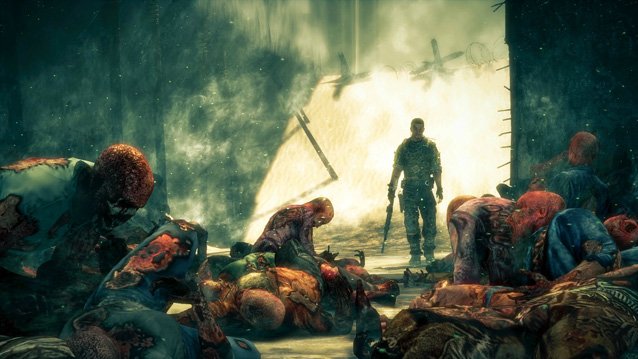
Some commentators have noted approvingly that Call of Duty 4: Modern Warfare’s ‘Death From Above’ mission accurately punishes the player for attacking a church. But the same mission allows the destruction of other undefended buildings which would be prohibited by the Hague Conventions. Moreover, a later DFA mission – in which the American player character circles a middle-eastern city in a chopper – allows the wholesale destruction of “buildings dedicated to public worship, art, science, or charitable purposes” (including what looks very much like a mosque) as well as “historic monuments”.
5. Civilization – Indiscriminate use of tactical nuclear weapons.
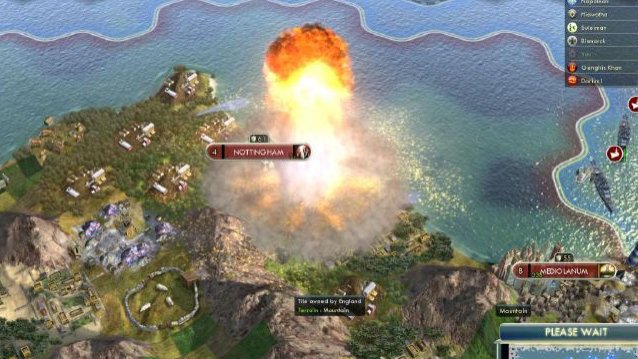
In 1996, the UN’s International Court of Justice issued an advisory notice on the subject of nuclear weapons. This notice argued that the vast destructive power of nukes would probably make their use a de facto war crime, since it is impossible to use them without causing massive indiscriminate loss of civilian life. You might think this would indict a whole range of games.
However, the Court said that it couldn’t definitively say whether nukes would be lawful or unlawful “in an extreme circumstance of self-defence, in which the very survival of a State would be at stake.” Video games’ penchant for high-stakes plots mean this happens more often than you’d think (the famous nuke in Modern Warfare, for instance, probably counts). Nevertheless, games like Civilization, which allow willy-nilly use of nukes for whatever purpose the player pleases, effectively include war crimes.
4. Call of Duty: Modern Warfare – Torture of surrendered enemies.
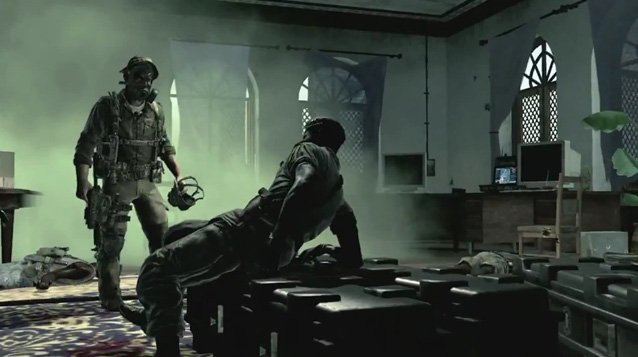
The previous entry doesn’t mean that Call of Duty is out of the woods. Both the first and the third Modern Warfare games include sequences in which Captain Price, accompanied by the player, interrogates, tortures, and then kills an enemy leader (Al-Asad and Waraabe respectively). Needless to say, these acts clearly violate the Geneva Convention, which forbids the torture and execution of captured enemies, especially when they’ve surrendered openly (as Waraabe does). If these men are war criminals themselves, it could also mean that Captain Price is interfering with their fair trial, which is, in itself, a crime.
3. Spec Ops: The Line – White phosphorous used in a manner contrary to the Convention on Chemical Weapons.

In Spec Ops’ seminal scene, the protagonist, Martin Walker, uses this terrifying chemical weapon to attack US army members – and accidentally incinerates thirty civilians. In this context, WP, or ‘Willy Pete’, probably counts as an ‘incendiary weapon’ under protocol III of the Convention on Chemical Weapons (of which the USA is a signatory). The same protocol forbids “indiscriminate incendiary attacks against military forces co-located with civilians”.
Walker would surely raise in his defence that he did not realise there were civilians nearby. But the use of WP against purely military targets may also be illegal. In Iraq, many reports claimed that US forces had used WP as an anti-personnel weapon in the city of Fallujah, and US army sources admitted as much. WP is controversial because it can be used legally to produce illumination or smokescreens, and forces using it as a weapon often muddy the waters by claiming they’ve only used it ‘legitimately’. But Peter Kaiser, a spokesman for the organisation which oversees the CWC, has said that if the “toxic properties” of WP are used to cause harm or death, it would necessarily fall under the definition of a chemical weapon.
2. Every FPS ever – Teabagging.
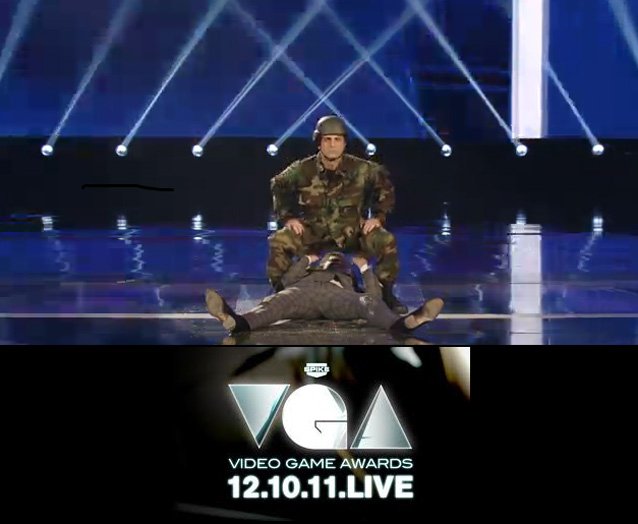
This war crime finds itself so high up the list because it is both universal and unending. The practice of crouching and standing over the body of an enemy to imitate shoving your balls in their face is, at the very least, a flagrant violation of the protections given by the Geneva Convention to the bodies of enemies, which must be treated honourably and not defiled. At worst, such conduct may amount to fictional war rape, which is defined by modern amendments to the Conventions as a crime against humanity. While the objection can be raised that the victims are already dead when this act is performed, I would point out that kill cams and respawn mechanics allow them to experience it as if they were alive – which is, indeed, the point of doing it in the first place.
1. Gears of War 3 – The crime of genocide.
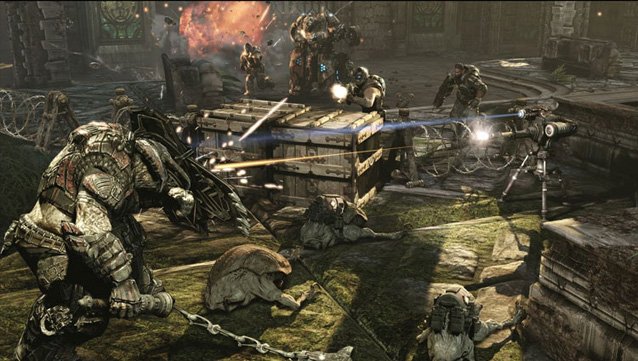
Genocide is without exaggeration probably the worst crime it is possible to commit. The ending of Gears of War 3 involves the protagonists committing genocide against the Locusts.
Throughout the previous series it is made clear that the Locust are effectively sentient and that they are at war with the human COG because the latter invaded their home territory. Both sides have committed terrible atrocities against each other, but the war ends with the protagonist’s father, Adam Fenix, using a super-weapon called the ‘Hammer of Dawn’ to destroy every last one of the insectile foe. This is despite his earlier promise to their leader, Queen Myrrah, that he would attempt to find a way to help them. So there you go: genocide committed.
No, I don’t care that they’re in a fantasy universe where the Geneva Conventions probably don’t exist. It’s genocide, for God’s sake. Destroy all video games now.




 How To Download Paint Jobs In Call of Duty: Black Ops III
How To Download Paint Jobs In Call of Duty: Black Ops III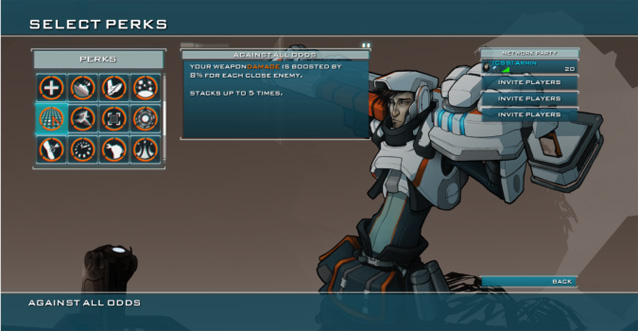 Sanctum 2: Dev Diary 4 – Weapons, Towers & Perks!
Sanctum 2: Dev Diary 4 – Weapons, Towers & Perks!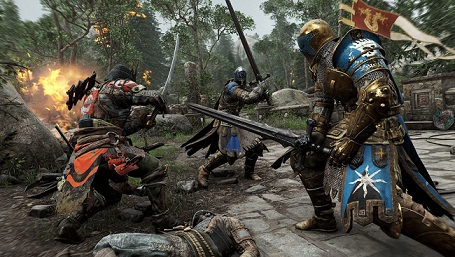 For Honor (PS4) - we tested it out at E3 conference 2015
For Honor (PS4) - we tested it out at E3 conference 2015 Smart Lock on Android Makes Locking Your Phone Way Easier
Smart Lock on Android Makes Locking Your Phone Way Easier 94% video game - Solution (Android / iOS)
94% video game - Solution (Android / iOS)